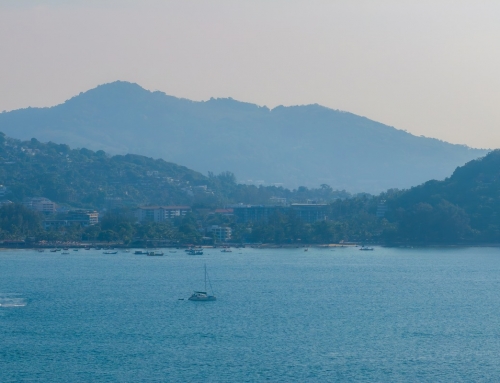Apart from taxes, the only other thing in life that is certain is death. Benjamin Franklin may have been right about that, but no matter how certain death may be, some people just don’t get around to planning for it.
Death comes to us all, but it doesn’t happen according to a schedule. This often means people just don’t get around to planning for it.
People who appear fit and healthy, can suddenly find things going wrong with their health in an instant. Often they have no time for regret; that is left to their families.
Planning for our passing is important. No matter where in the world you live, or where your assets are held, you should be sure to make a Last Will and Testament.
There’s no reason why the same shouldn’t apply if you live in Thailand. If you have assets here, you should prepare a Will. It’s relatively quick and easy to do.
Planning ahead ensures your loved ones will be looked after and makes the settlement of your estate far easier for everyone concerned.

Do I need a Will in Thailand?
If you have Thai assets, especially something of significant value like real estate, then the answer is a resounding yes. You should definitely make sure you have a Will in place.
We recommend that you use a Thai lawyer to write a Will. It is quick and easy to do, and a good lawyer can assist you in doing it right.
When you get the Will, get as many copies as you need. Give one to every family member who you have named as a beneficiary. Make sure your lawyer keeps copies, keep one safe yourself, and also give one to a trusted friend.
What Happens to My Thailand Assets If I Don’t Leave a Will?
In Thailand, there are no forced heirship laws.
Forced heirship means that by law, the assets must be divided up amongst descendants and spouses. Countries such as France, Italy, Spain, and Portugal have forced heirship. Even Japan and many Arabic countries handle estates in this way.
Thailand, like many other nations, adheres to the rules of intestacy. If you die intestate (e.g. without a Will) your assets will be shared out equally between the statutory heirs.
This means that assets are distributed according to different classes of statutory heirs, usually with descendants and spouses coming first.
Even if you are married to a Thai national, the settlement of the estate without a Will still inevitably turns into a lengthy process. And this means legally married – not a common law marriage.
If you’re not married to your partner, even if you have shared everything with them for many years, he/she will have no legal claim to any of the assets should you die intestate.

No Will AND No Children in Thailand
What happens if you don’t have any family in Thailand and you never left a Will?
In short, your family will be placed in an even more distressing situation.
To start with, they might have to fly 12,000 miles to get here. Once here, the first hurdle is to prove they are who they say they are.
Then they will have to go through the settlement of your estate. It’s a complicated, long-winded process that can only really be done using a Thai lawyer.
The fact is, it could all take years to resolve. And as the lawyers’ work is quite in-depth, the fees involved will not be cheap. Depending on how long it takes, a huge chunk of the estate’s value could be lost in lawyers’ fees alone.
There is also the chance that the authorities do not even recognize your family member as the beneficiary, which could mean they receive nothing.
Can I Use a Will Made In My Home Country For Thailand?
Having a Will only in your home country to include Thai assets doesn’t make sense.
Although technically it would be accepted, it could take a long time to get through Thailand’s required probate procedures. The whole thing has to go through the Thai courts.
This presents new challenges. It’s highly unlikely that the country you come from speaks Thai. That means the Will first needs to be translated before the process can even begin. The translations also need to be notarized, and then authorized by The Ministry of Foreign Affairs.
Filing a foreign Will is just not worth it, unless it’s the last resort, or there are unique circumstances. For example, in the absence of a local Thai Will, it may be the only option if no other statutory heirs exist in Thailand.
Does My Thai Partner Need to Write a Will?
A good lawyer will also recommend your Thai spouse makes a Will. It is not uncommon for the Thai partner to die first. Without a Will, the family of the deceased partner may stake their own claim to the assets, making things very difficult for the surviving spouse.
The worst case scenario is that the foreign spouse has no legal ownership of any major assets, and could lose everything to the family of the deceased.
This applies to everything the deceased spouse had in his/her name.
Does Thailand Have Inheritance or Estate Taxes?
There are no estate taxes or inheritance taxes in Thailand.
What If I Inherit Property?
If you inherit a property as a foreigner there a few things to consider.
Firstly, if it is a landed property (land, a villa, a bungalow), you are allowed to inherit it, but you will not be allowed to title it in your own name. The property must be disposed of – to a Thai national – within a reasonable period of time (typically 180 days).
If the property is a condominium, the inheritance laws are more favourable. If you inherit a condominium you’re required to inform the Land Office within 60 days. You will need to present the officer with a copy of the Last Will and Testament, the Death Certificate for the former owner, and a court order confirming the appointment of an administrator for the estate. It is possible you will also be asked for copy of a family tree, and any other documents which may support your claim of inheritance. As with anything official, there will be some fees involved because the title deed will have to be transferred into your name.
Please note that while the law allows you to inherit a condominium in Thailand, there are actually two pieces of legislation which address inheritance. Of course there’d be no need to mention this if they agreed with one another. They don’t agree, nor can lawyers agree which one carries the most weight.
The Thai Civil and Commercial Code (CCC) implies that anyone who inherits a property also inherits the right to own the property. This has actually been the formal legal opinion of the Land Department.
The Condominium Act, however, states that a foreigner inheriting a condo, must meet specific criteria for ownership, or else they would have to sell the unit (typically within 1 year of the death of the owner).
Whether or not you get to keep your inherited condo may come down to something as simple as which judge hears your case on the day.
Do I Have to Use a Lawyer?
Not really. But we always stress for matters of extreme importance, you should use a good lawyer.
Just because you are a foreigner, it does not mean you can’t get legal help in Thailand. There are many services provided by the state in Thailand, and making a Will is one of them.
If you have Thai assets, the local Amphoe can help you to prepare a Will. It also helps if you are familiar with Thai procedures. (Please Note: You can only do a Will at the Amphoe if you can speak and write the Thai language.)
If you go this route, you will need witnesses to the Will and you should also nominate an executor. The witnesses cannot also be beneficiaries, nor can they be an executor.
If you prepare a Will butt don’t appoint an executor, it is the duty of the Public Prosecutor to file and nominate an executor for you.
Summary
There are thousands of foreigners buying property in Thailand every year. Many of them don’t give a second thought to making a Will.
A Will is relatively inexpensive, just a few thousand Baht, so it makes absolutely no sense not to have one.
Don’t be lazy. An hour of your time now can save thousands of hours, lots of stress and a great deal of money for your loved ones later.
Please see some of our other related articles:
The Importance of Sound Legal Advice When Buying Property in Phuket
China’s Spending Spree on Phuket Real Estate
Reasons to Invest in Phuket Property for New and Experienced Investors
An Overview on Phuket Property Prices
Understanding the Administrative Districts of Phuket
The Rising Popularity of Branded Residences
Illegal Home Ownership in Thailand – An Inconvenient Truth
Owning a Freehold Condominium through an Offshore Company
Buying Freehold Villas or Houses in the Name of a Thai Spouse





Social Contact